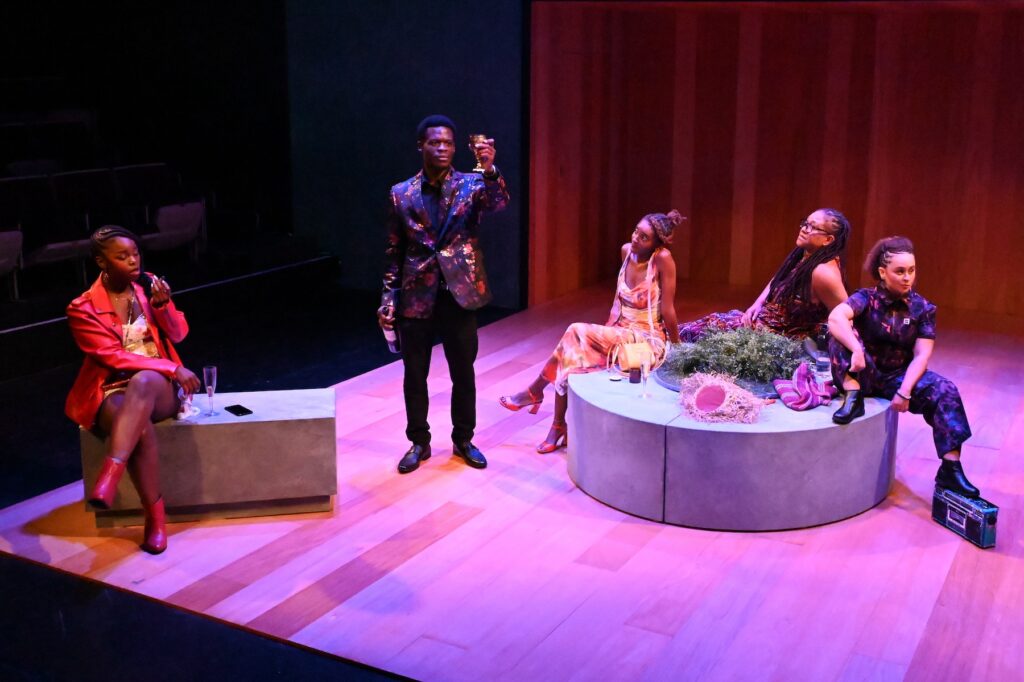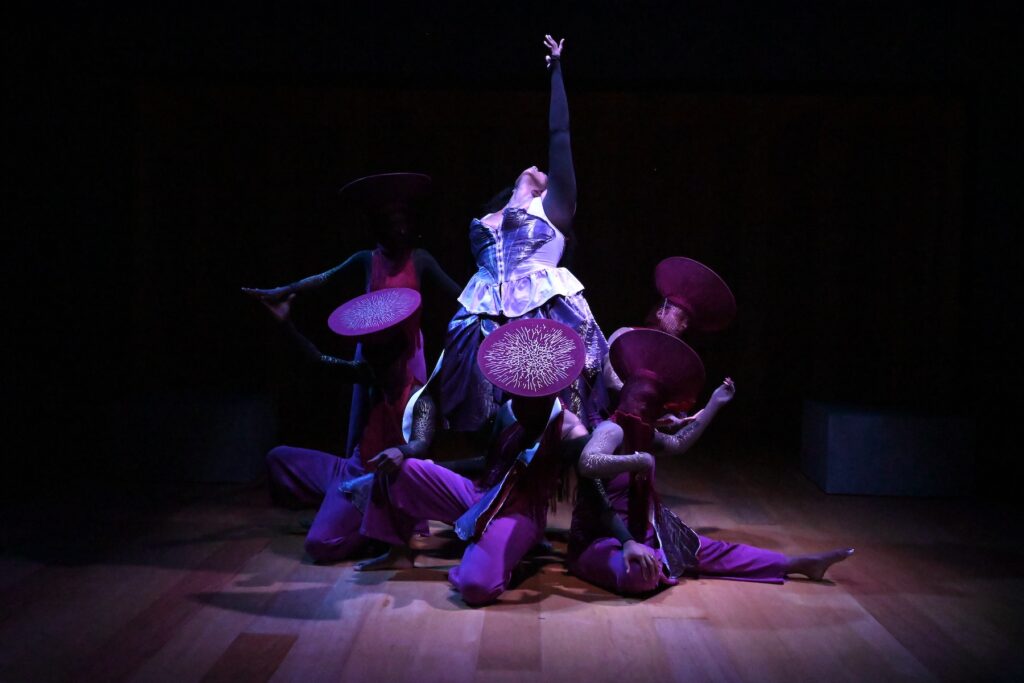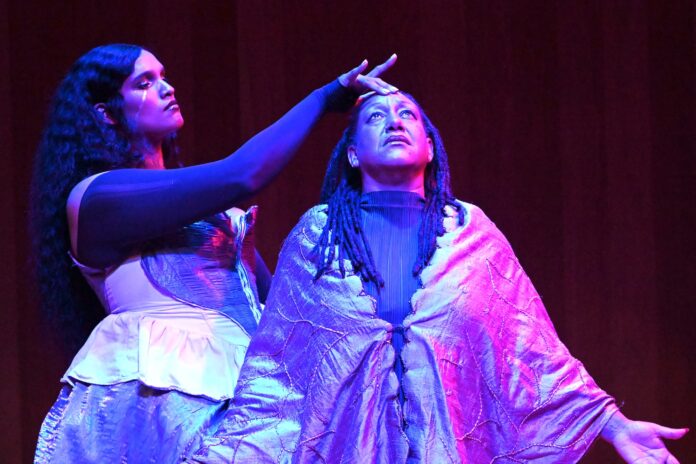Me being me (always aware of the pandemic still raging around us), I appreciate seeing more masks at shows than I expect these days. Not just because this opening night performance was a mask-required show, but also because the use of masks factors into the show itself in essential and innovative ways. At points in each of the three acts of the play, a character walks on masked: The first two times as an act of personal security, the final times representing characters with erased identities. As safe as it can be to instantly hide or protect one’s identity, the ability to have that identity stolen from you is now easier than it ever was.
Star Finch’s Shipping & Handling (world premiere through September 7 at the Magic Theatre in Fort Mason, SF) went down a long and winding road before arriving for its opening. Its inception began in 2016, followed by initial creation steps in 2018. The play was first announced by Crowded Fire in 2020 before being delayed by COVID concerns again and again and again over the course of four years. Having now finally reached the Magic stage (the same stage that produced Finch’s SF COVID dramedy Josephine’s Feast), the result is less a three-act play and more three short plays put together.
The first part finds us backstage during the opening night of Indigo, an Afrofuturist play within a play. Its all-Black ensemble (Tierra Allen, Jasmine Milan Williams, Jamella Cross, Cat Brooks, and Andre K. Jefferson) are decompressing after their first show with a mix of weed, wine, and gossip—plus a little flirtation. As their guard lowers and inebriation grows, they begin to openly ponder their play’s themes of AI ethics: Is the same line of thinking raised in the script exactly how Black people were forced into slavery? At the same time, can an AI experience such uniquely human features as depression, generational trauma, and true community?
The third act finds us within the play Indigo itself. The story drops us in a far-off future where ground-breaking creator Dr. Mother-Mercy (Brooks) oversees one of the world’s remaining natural pieces of land, from where she seems to virtually host a self-help program. She’s the only human inhabitant, along with the many robots of her own design. Speaking of which, the good doctor isn’t looking forward to the impending arrival of her greatest creation, the eponymous Indigo (Davia Spain). From the doctor’s perspective, Indigo’s arrival may mean the doctor’s departure in more ways than one.

These two acts are brilliant. The natural banter of the Black actors backstage is—I say from experience—hilarious (“My sexual energy’s like my In-N-Out burgers: animal-style!”) and touching. From the swagger of the one Black man in the group to a conversation about travelling back to warn the ancestors about slavers, I found myself taken back to the few all-Black ensembles of which I’ve been part, and wishing this were the pilot episode of a weekly series I could see every week. When the traditional dance is broken by a quip about needing a ride across the Bay Bridge, I was sold.
The play-within-a-play was likewise gripping to the point that I wished this was one scene of a full production. Even before this act, there’s a comment about Black people (or the lack thereof) in sci-fi, and I was reminded of Octavia Butler supposedly saying she got into sci-fi because “there were no Black people in the future.” Indeed, the Indigo section—with its amazing costumes by Brooke Jennings (with whom I’ve worked before)—has a Butler-esque ring that will immediately be recognizable to anyone who’s read the Patternist or Parable books. Had the entire show been just the two aforementioned acts, I’d already be declaring it a masterpiece.
Yet, it stumbles in the act bridging the two together. The second act is a semi-meta self-hosted talkback by Indigo’s unnamed Playwright (Rolanda D. Bell). She steps out in a primary-red balaclava and an eye-catching gold-on-black dress to share with us her thoughts on the importance of hiding one’s face in CCTV world, the racial subtext of the film Ex Machina, the Black church experience, and much more. It also includes audience interaction, with an informal poll of various topics taken via noisemakers handed out to the audience along racial lines.

It’s not that the act is bad, it just doesn’t fit with the acts preceding and following it—not as is, anyway. One can assume this is Finch most blatantly pontificating via avatar, and the insights she provides do ring sincere. But this section goes on way too long. Had a good chunk of it been removed (say, the audience interaction), it would have more likely had the effect she was going for. Or, if this section were to be done in its entirety, it’s the sort of thing that would work better as a standalone one-act in a festival or special showcase. But then, one wouldn’t have the context of the Playwright’s work, nor the insight of the actors in said work. Still, the bloat of this section needs to be pruned for a greater work overall.
Help us save local journalism!
Every tax-deductible donation helps us grow to cover the issues that mean the most to our community. Become a 48 Hills Hero and support the only daily progressive news source in the Bay Area.
Especially since Finch and co-directors Lisa Marie Rollins and Leigh Rondon-Davis have an excellent cast on their hands. It would probably be unfair of me to single any of them out, but I will say that when the backstage folks are discussing going back in time, Jamella Cross’s plea that the ancestors love each other has her speak with a tremor that genuinely shook me. I should also mention that Tanya Orellana has delivered another winning set by relying on simplicity in depicting both present and future. The wood-paneled floor is covered with three sky-blue set pieces used by the cast, the centerpiece of which is disassembled and reassembled into round and triangular shapes. None of it steals attention, but you find yourself looking over all its details extensively. Great work.
Also well done was the aforementioned mask requirement for opening night. Since Josephine’s Feast remains one of the few plays to actually take place during this still-ongoing pandemic (let alone featuring an ever-rarer Black family in San Francisco) and Shipping & Handling was repeatedly delayed by the pandemic, you’d think the latter would mention it somewhere other than the pre-show speech? In any case, audience members were pretty good about keeping their masks on. My Aranet4’s CO² readings peaked around 1423ppm by the end of the first act, hovering down around 1213ppm by the final bow. Probably not the worst I’ve seen in that theatre.
After all the years it took for Shipping & Handling to come to life, the result is two excellent acts sandwiched around one that desperately needs some editing. But those two acts make the show absolutely worth seeing. After the long journey it’s taken, everyone should at least celebrate that it got to the finish line—without the help of artificial intelligence.
SHIPPING & HANDLING world premiere runs through September 7 at the Magic Theatre in Fort Mason, SF. Tickets and further info here.





